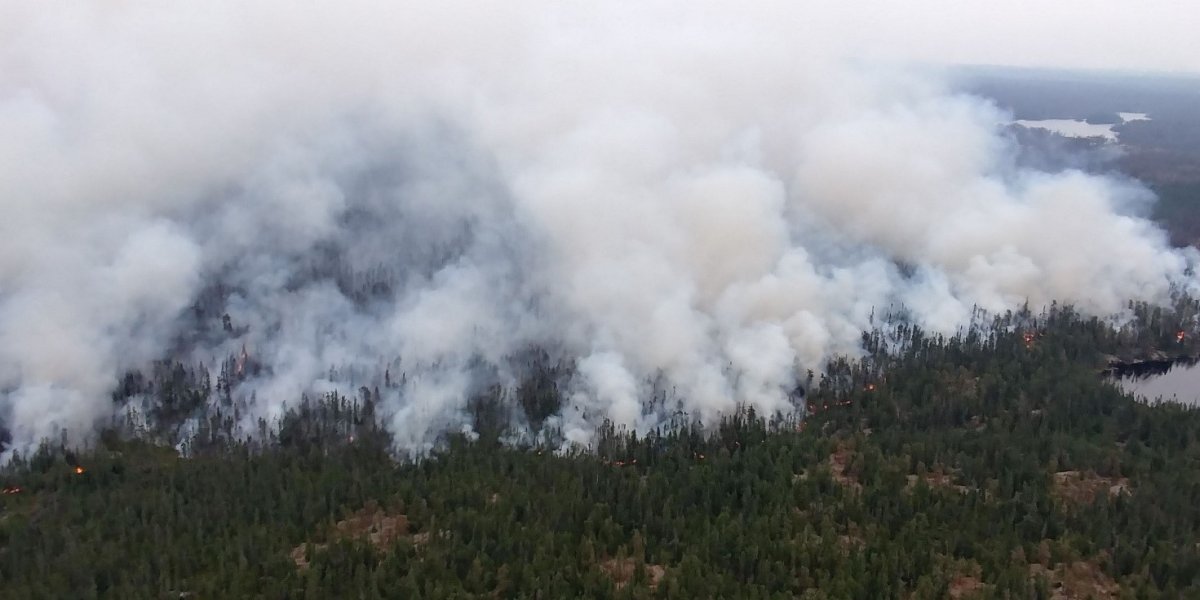Hundreds of members of a northwest Ontario First Nation have been temporarily relocated to London, Ont., due to the looming threat posed by a massive wildfire that currently stands as the largest seen in the province so far this year.

At least 485 people from Wabaseemoong Independent Nations have already been evacuated as a result of the ongoing Kenora 51 fire, according to the province. The First Nation declared an emergency on Monday and asked that all community members voluntarily evacuate.
Kenora 51 began in June and is still considered out of control. As of Tuesday, it stood at 200,511 hectares in size, according to the Ministry of Northern Development, Mines, Natural Resources and Forestry.
The fire is located about 20 kilometres to the north of Wabaseemoong Indian Reserve on the northern side of Umfreville Lake. The reserve itself is located about 50 kilometres northwest of Kenora, Ont.
Due to smoke and concerns the fire may cross the lake, First Nation officials have been in the process of evacuating residents of the reserve with flights out that began earlier this week.
Community members were told by Wabaseemoong’s chief and council on Monday to evacuate voluntarily to either London or, if flying was an issue, to Wauzhusk Onigum Nation near Kenora.
“In London, the experience will be fully supported: medical, mental health, cultural, activities/entertainment, pharmacy, and all basic needs will be met,” a release to the community reads.
“This is your final opportunity to evacuate voluntarily. There is limited support staff remaining in the community after (Monday). If you choose to remain, you must have the ability … to leave on short notice.”

Many Wabaseemoong community members now find themselves more than 1,000 kilometres away from home, anxiously keeping watch on the situation unfolding up north.
“Individuals and families, elders, people of all ages continue to come into the city,” said Raymond Deleary, executive director of Atlohsa Family Healing Services.
“As you can imagine, they are all worried about their homes. They’re worried about their family members that they’ve had to leave behind or become temporarily separated from as they make their journey here.”
The local non-profit, which provides Indigenous-led programming and services to the community, has been co-leading an effort alongside Southwest Ontario Aboriginal Health Access Centre, in alliance with the province, to support the evacuees.
“They have instructions to not take too many belongings with them, so there are restrictions on how much they can have with them,” Deleary said.
“All of that combined with being in a new environment so far from their home territory, as you can imagine, just adds to what they are contending with at this moment.”
Atlohsa is taking monetary donations from the community to help support those from Wabaseemoong Independent Nations who are now staying in London, Deleary says.
- Life in the forest: How Stanley Park’s longest resident survived a changing landscape
- ‘They knew’: Victims of sexual abuse by Ontario youth leader sue Anglican Church
- Carbon rebate labelling in bank deposits fuelling confusion, minister says
- Buzz kill? Gen Z less interested in coffee than older Canadians, survey shows
“Some people just came with the shirts on their back. So what we feel is most helpful to them in practising their own autonomy and exercising their own choice is to provide monetary donations,” Deleary said.
“We can then purchase the gift cards or gift certificates and families and individuals can go about doing what it is that they need to do and get the items that are most needed right now.”
Donations can be made through Atlohsa’s online donation page by selecting “Wabaseemoong First Nations Evacuee Support Fund.”
At least 120 forest fires were listed as active in Ontario on Wednesday, with 114 in the northwest region. Kenora 51 is the largest followed by Red Lake 16 at 165,880 hectares and Red Lake 51 at 53,522 hectares.
As of Monday, fires had led to the evacuations of at least 468 people from Poplar Hill First Nation, 931 people from Deer Lake First Nation and 962 people from Pikangikum First Nation, the province said.
Repatriation is underway for members of Pikangikum First Nation while members of Cat Lake First Nation and North Spirit Lake First Nation have been fully repatriated following previous evacuations.
Ontario has recorded at least 1,070 forest fires since the start of the year, more than double the number seen in 2020.
Wildfires are also scorching western Canada.
Nearly 6,600 square kilometres of trees and bush have burned in B.C. since the start of the wildfire season on April 1 and more than 30 fires are considered threatening or highly visible.
–With files from The Canadian Press








Comments